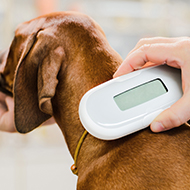
Fern's Law and Tuk's Law have each received over 100,000 signatures.
MPs are set to debate two widely-shared petitions relating to the microchipping of pets in Westminster Hall on Monday (28 June).
The first petition, known as Fern’s Law, calls on the Government to make it compulsory for vets to scan and check microchips to reunite stolen dogs and cats.
With more than 112,000 signatures, the petition states: “Many missing microchipped pets are never reunited as it’s optional to scan & check microchip registration. It’s time veterinary professionals, authorities and rescues checked pet & keeper match on the original database at a pet's first consultation or yearly checkup. It’s their only chance to get home.”
Responding to the petition, the Government said: “BVA and RCVS provide necessary guidance to scan dogs. We will consider reform options including whether this should be mandatory as part of Post Implementation Review of the microchipping regulations.”
The second petition, known as ‘Tuk’s Law’, urges the government to make it compulsory for vets to scan before euthanasia for rescue backup and confirm keeper details. With more than 121,000 signatures, the petition states: “A healthy young dog with RBU was euthanised. The person who requested euthanasia was not the registered keeper.”
Responding to this petition, the Government said: “The Government understands the distress that the death of a pet can cause and is considering scanning requirements, as part of the Post Implementation Review of the microchipping regulations.”
The RCVS and BVA have previously urged caution around these petitions. While the organisations agree more could be done to prevent dogs from being needlessly put to sleep, they fear that a legislative approach could undermine a vet’s clinical judgement and unfairly involve vets in ownership disputes.
BVA senior vice president, Daniella Dos Santos, said: “Campaigns to introduce compulsory microchip scanning deliver attractive headlines but fail to recognise that the implementation is complex. Vets’ primary role must be in providing veterinary care for animals and they should not be put in the position of policing the law or untangling ownership disputes, which could result in people not seeking veterinary treatment.
“We know that the headline policies will be popular, but we urge the government to work through the detail before committing to something that is at best unworkable and at worst detrimental to animal welfare.”
In consultation with Defra, the BVA and RCVS has developed new guidance that will require vets to scan for a microchip in dogs before euthanasia where, in their professional judgement, destruction of the dog is not necessary on animal health or welfare grounds.
RCVS president Dr Mandisa Greene, said: “We are confident that our new guidance will significantly reduce any risk of unnecessary and unwanted euthanasia while continuing to help veterinary surgeons help animals under their care to the best of their abilities.”
MPs will debate the petitions for 90 minutes, during which they will be able to question Government ministers directly about these issues. The discussion starts at 16.30 and will be live-streamed on Parliament TV and YouTube.



 The Veterinary Medicines Directorate (VMD) is inviting applications from veterinary students to attend a one-week extramural studies (EMS) placement in July 2026.
The Veterinary Medicines Directorate (VMD) is inviting applications from veterinary students to attend a one-week extramural studies (EMS) placement in July 2026.